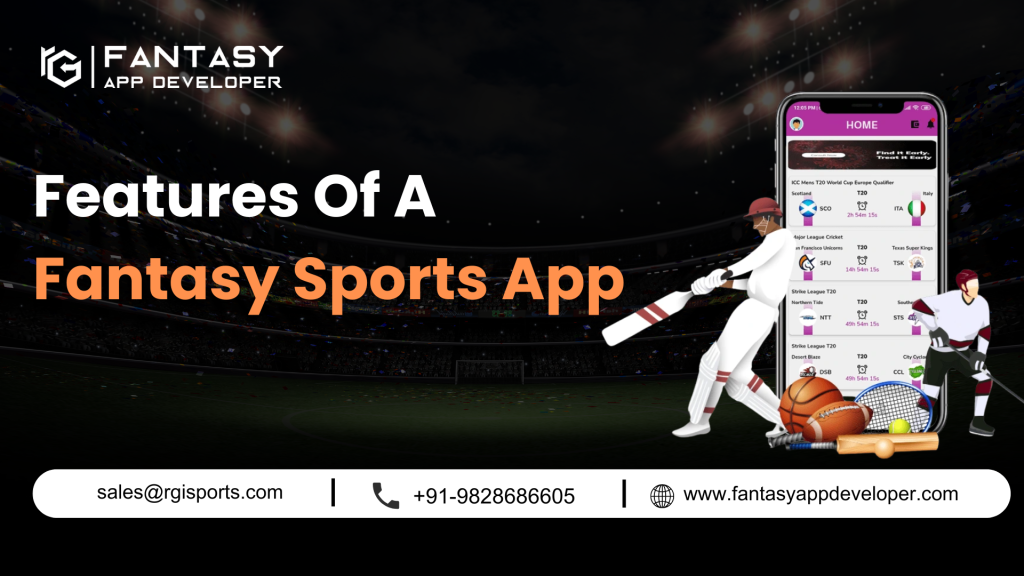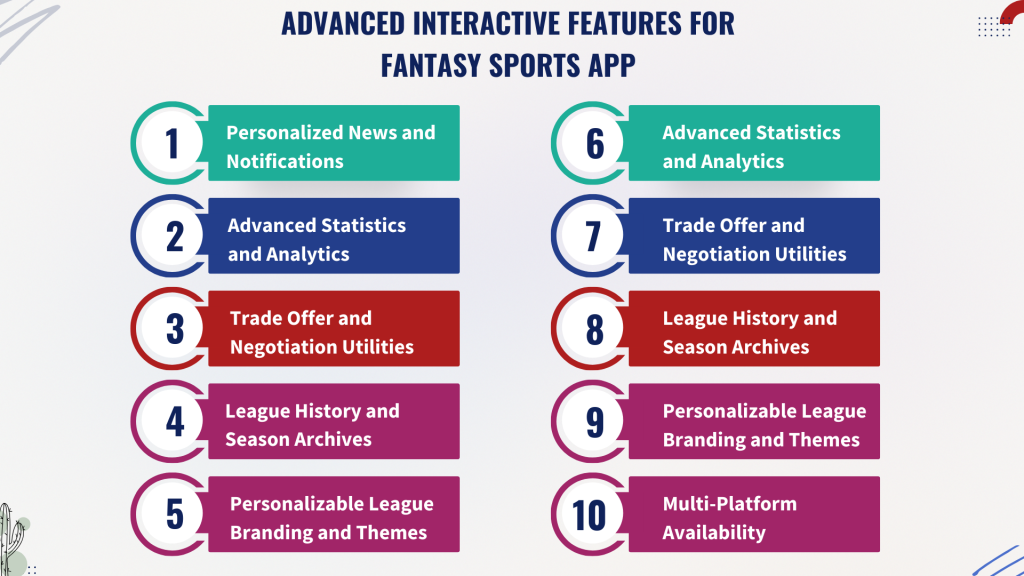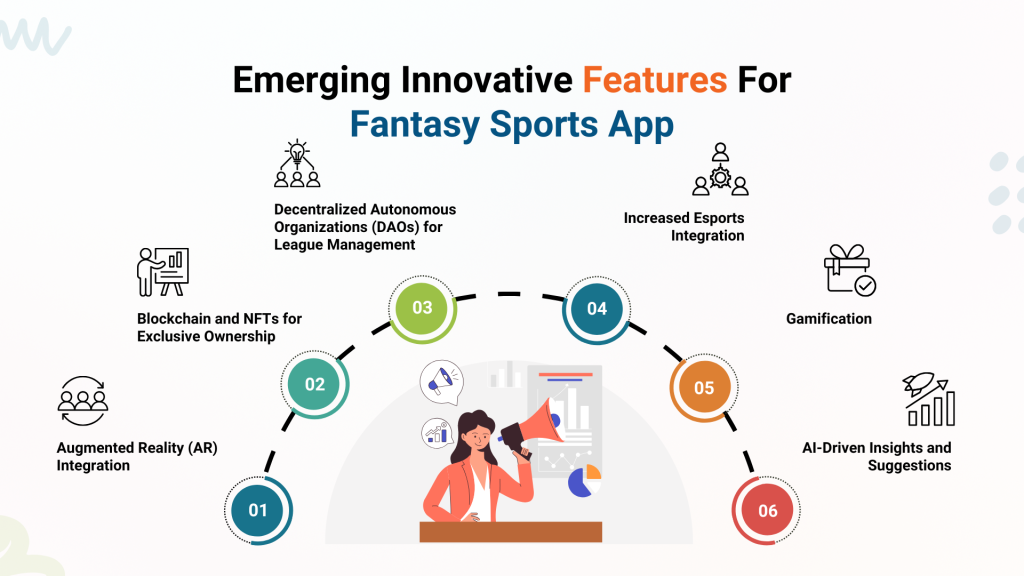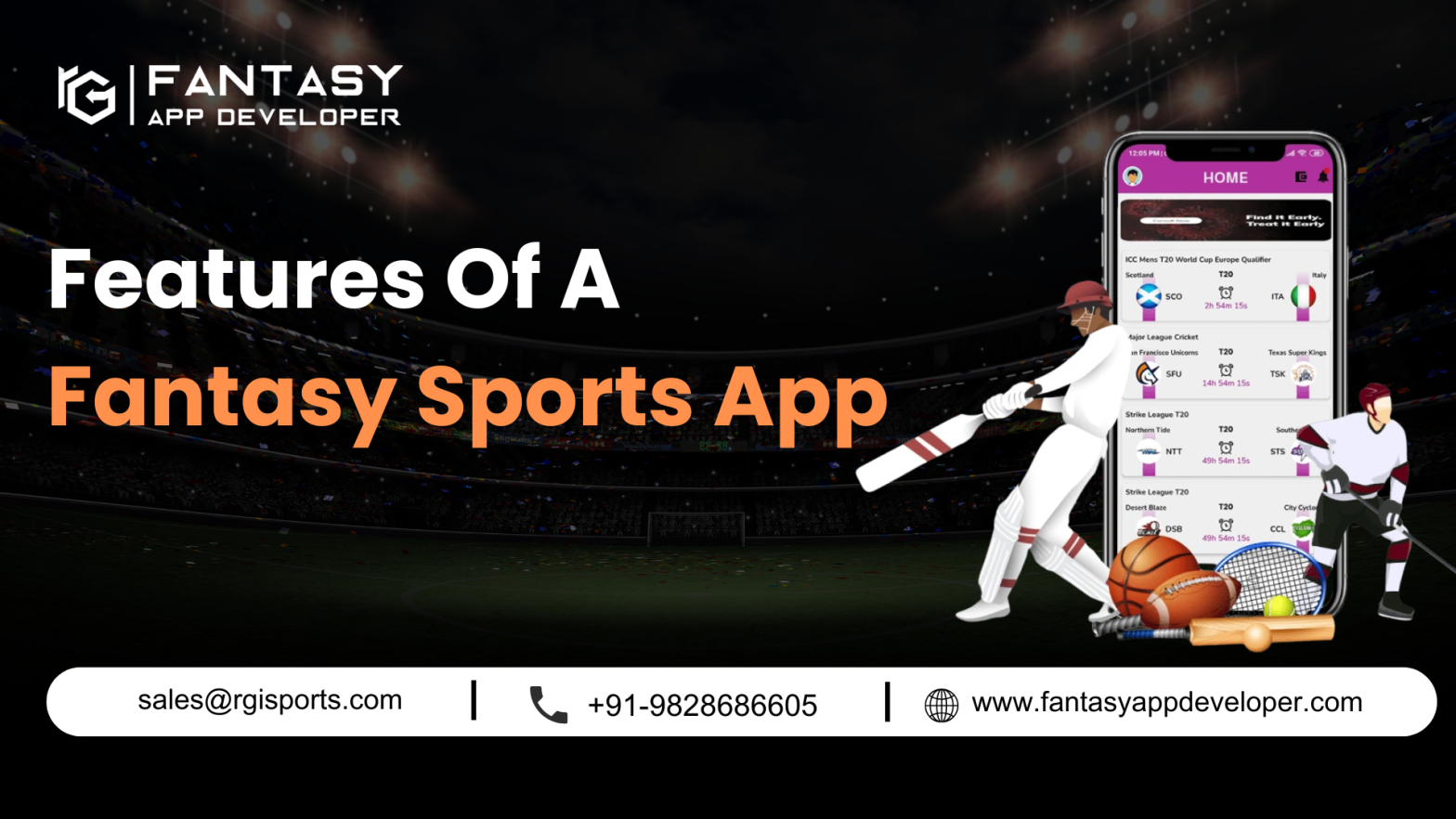
Summary:
To succeed in 2025, a fantasy sports application should offer a seamless onboarding experience for new users and easy-to-use virtual team management features with live updates. This blog guides you through the must-have features like Secure payment methods and solid community features, which are important for the market stability of an app. Customized news and data-based insights will enable better decision-making, while support for multiple sports and gamification will encourage users to come back to your app.
Fantasy sports have revolutionized how people interact with games, enabling users to become a team manager for a day, selecting players, making day-to-day choices, and putting them against each other according to real performances.
Imagine this: your beloved team is losing, but your fantasy lineup wins due to a well-thought-out selection. That’s the special rush fantasy sports provide—making viewers into decision-makers.
This two-layered experience is precisely what makes fantasy sports so engaging. It converts passive watching into active participation, fueled by a mix of ability, forecasting, and live-time decision-making. But the secret to providing this immersive experience is in a well-crafted fantasy sports app—one that includes usability, data precision, and creative features to engage users.
In this blog, we’ll dive into the essential features that elevate a fantasy sports app from functional to phenomenal.
What is a Fantasy Sports App?
A fantasy sports application allows you to build and control virtual squads of actual sportsmen. Points are scored in your fantasy squad by their real-game performances. You’re racing against other members in leagues using drafts, trades, and lineup decisions weekly from your mobile. It’s interactive, fun, and a way of connecting with sporting events and peers.
Rather than simply observing the games, you’re a team manager, selecting players and creating lineups. Your fantasy team accumulates points depending on how well the actual players perform in their actual games. It’s a game of strategy and skill where your sports acumen enables you to play against other fantasy team managers in leagues for bragging rights or even awards. Consider it to be an interactive and exciting means of enjoying your favorite sports.
Explore Top Fantasy App Features With a Fantasy App Developer to Engage Your Audience.
Fantasy Sports App Overview
A fantasy sports application is an online environment that enables one to build and control virtual teams of actual sportspeople. The performances of these virtual teams are judged based on the real statistical records of the picked players in their actual games. It’s a strategic combination of sports insight and team management that enables fans to compete against each other in virtual leagues.
According to a recent market study report published by Custom Market Insights, the India Fantasy Sports Market has registered impressive growth. Worth approximately USD 25.44 billion in 2022, the industry is expected to grow to around USD 28.98 billion in 2023 and is expected to grow to about USD 72.06 billion by 2030. This is a massive Compound Annual Growth Rate (CAGR) of 13.9% from 2022 to 2030. To put it simply, the fantasy sports industry in India is flourishing and is likely to double its value by the end of the decade.
These apps allow you to construct dream teams of actual players and earn points based on their true game statistics. You join leagues, maintain your roster, make trades, and play against other people. Features typically included for real-time scoring, leaderboards, and chat for a social and interactive sports experience. If you want to know about the working process of fantasy sports apps, explore our guide on How Fantasy Sports Apps Work to learn about working in detail.
Core Features for Any Fantasy Sports App
Let us begin with the foundation – the flat-out necessity fantasy sports app features that are the building block of any successful fantasy sports platform. Consider them the players you can’t live without on your roster; without them, you’re already behind.

Easy User Registration and Profile Management: First impressions count. A clean and seamless registration process is important to bring in and keep users. Whether it’s via social media login, email confirmation, or a minimal form, joining up should be easy. In, users must have strong profile management features to customize their experience, monitor their progress between leagues, and update their account information. This involves such aspects as providing a display name, uploading one’s profile picture, and taking care of notification preferences.
Detailed League Formation and Membership: The core of fantasy sports is the leagues. A world-class app enables users to form their leagues with adjustable rules, scoring systems, draft configurations, and league sizes at their fingertips. Equally important is the feature to join public or private leagues seamlessly using invitation links or in-app search features. Unambiguous league details and convenient access are crucial here.
Intuitive Team Drafting Interface: The draft is perhaps the most thrilling aspect of the pre-season! The app must have a well-structured and intuitive drafting interface. This features such things as player rankings, search and filter functions by position, team, projected points, etc., live draft pick tracking, autodraft options for time-pressed managers, and easy visibility of team rosters and picks available. A seamless and thoughtful draft experience is crucial to user interaction.
Real-Time Scoring and Live Match Updates: That’s where magic happens throughout the games! Your app needs to deliver correct and almost real-time scoring updates reflecting the actual in-game performance of the players who are part of your virtual squad. Live match stats, play-by-play updates (even if only text), and concise graphical representations of your team’s progress against your competition are a must to keep your users stuck on their screens.
Clean and Configurable Scoring Systems: Scoring systems vary between different fantasy sports. A clean app provides league commissioners with the capability to configure scoring options to suit their needs. These include scoring points for a variety of player actions (tackles, assists, goals, etc.), negative scores for mistakes, bonus points, and configurable scoring point values. Visibility of the scoring rules of the league within the app is also of top importance.
Secure, Strong, and Diverse Payment Channels (for Paid Leagues): For paid leagues with entry fees and prize pools, the app must integrate secure and trusted payment gateway channels. Multiple payment options (credit/debit cards, digital wallets) ensure easy convenience for users to be part of paid leagues and claim their winnings. The application must provide simple-to-use functionalities for weekly lineups, waiver wire pickups (picking up free agents), trading with other owners, and handling players that are injured (IR slots are a godsend!). Complete transparency in transaction history and secure handling of financial details are absolute requirements.
Advanced Interactive Features For Fantasy Sports App
After the essential functionalities are implemented, it’s time to consider features that make the fantasy sports experience go from great to outstanding. These are the features that build community, bring excitement, and keep users entertained throughout the extended season.

Personalized News and Notifications: Staying informed is crucial in fantasy sports. The app should provide personalized news feeds relevant to a user’s roster, including player injury updates, performance analysis, trade rumors, and upcoming match previews. Customizable push notifications ensure users don’t miss critical updates or lineup deadlines.
Advanced Statistics and Analytics: Fantasy sports data is the king. Offering users the ability to see advanced player stats, past performance history, opponent matchup data, and even predictive stats can enable them to make more knowledgeable roster decisions and trade proposals. Displaying data such as charts and graphs can make the data easier to consume.
Trade Offer and Negotiation Utilities: Player trading is a tactical aspect of numerous fantasy leagues. The app needs to provide intuitive utilities for submitting trade offers to other managers, such as being able to submit multiple players and draft picks. An in-app negotiation interface can simplify the process of trading and make it more interactive.
League History and Season Archives: Nostalgia is a strong feeling. Providing access for users to previous league results, draft history, end-of-season standings, and even highlight moments from past seasons adds richness and enables bragging rights and nostalgia.
Personalizable League Branding and Themes: Allow commissioners to tailor leagues to their specifics by assigning customized names, logos, and even visual aesthetics. This provides a personal feel and enhances the ownership and community sense for private leagues.
Multi-Platform Availability: In the current era, users want to be able to access their fantasy leagues easily across multiple devices – iOS and Android smartphones, tablets, and web browsers. A responsive and uniform experience on all platforms is crucial for user convenience.
Emerging Innovative Features For Fantasy Sports App
The technology world never remains static, and neither does fantasy sports. Below are some innovative and upcoming fantasy sports app features that are defining the future of the game:

Augmented Reality (AR) Integration: Envision being able to project real-time player stats onto your screen while watching an actual game, or even see your fantasy matchup in an interactive AR space. Although still in the beginning phases, AR has thrilling potential for taking the viewing and participation experience to another level.
Blockchain and NFTs for Exclusive Ownership: The advent of blockchain technology and Non-Fungible Tokens (NFTs) may transform fantasy sports by enabling users to be the owners of exclusive digital copies of players or even full virtual teams, introducing a new dimension of scarcity and collectability.
Decentralized Autonomous Organizations (DAOs) for League Management: Picture leagues run by their members in a DAO framework, enabling fully democratic decision-making on rules, scoring, and prize distribution.
Increased Esports Integration: With esports’ popularity increasing, anticipate more fantasy leagues based on professional gaming, with features customized to the distinct dynamics of esports competitions.
Gamification: Consider interactive quizzes, trivia challenges, and mini-games embedded in the app to engage users during non-game times and provide the chance to win rewards or bragging rights.
AI-Driven Insights and Suggestions: Artificial intelligence can be utilized to offer users more advanced player analysis, trade suggestions, lineup optimization ideas, and even forecast matchup results.
Key Considerations for Developers
For developers who want to build the next huge fantasy sports app, a list of features is not sufficient. Below are some essentials of building a successful platform:
Scalability and Reliability: The application should be scalable to a massive increase in traffic during drafts and live game days without slowing down or crashing. A strong and scalable infrastructure is essential.
Accuracy and Real-Time Feedback: The timeliness and precision of data feeds for player scores and statistics are crucial. There is an expectation of almost real-time updates by users.
Security and Privacy: User data and financial information must be protected at all costs. Strong security and transparent privacy policies are paramount.
User Experience (UX) and User Interface (UI) Design: A clean, intuitive, and visually pleasing interface is essential for user adoption and retention. Navigation needs to be effortless, and information needs to be readily accessible.
API Integrations: Integrating with trustworthy sports data providers is necessary for retrieving accurate and up-to-date information.
Community Building Tools: Encouraging a sense of community through chat functionality, forums, and social sharing options is essential to long-term engagement.
Monetization Strategies (if any): Think about different monetization models like premium features, advertising (done tastefully), or commission on paid leagues. Whether you are an aspiring entrepreneur or a developer working the monetization strategies are a must to know.
Compliance with Regulations (particularly for betting features): If implementing any type of wagering, be fully compliant with local laws and regulations. For knowledge on European laws, see our guide and comprehend European laws related to fantasy sports in detail.
Key Fantasy Sports App Features For Panel: A Complete Breakdown
To develop a high-performing and user-friendly fantasy sports app, it’s necessary to know about the various panels involved and the central features of each that we need to have. Segmenting the app’s functionality panel-wise assists in making user experiences lean and ensures smooth administration for end-users and administrators alike. Here are the top fantasy sports app features of 2025 segmented by three central panels: User Panel, Admin Panel, and Analytics/Moderator Panel.

1. User Panel Features – Fantasy Sports Gameplay Experience Enhancement
The User Panel is the core of any fantasy sports app. It’s where users play, interact, and engage with the app. These functionalities need to be intuitive, responsive, and aimed at increasing user satisfaction and retention.
Key user-side functionalities in a fantasy sports application are:
- User Registration/Login: Safe sign-up with support for email, phone, or social media login.
- Profile Management: Allow users to handle personal information, payment records, and game statistics.
- Create and Join Contests: Users can create teams, join contests, and view match details.
- Live Match Scores and Updates: Real-time score updates and fantasy points tracking.
- Team Management: Update, edit, and draft teams before the deadline.
- Wallet & Payments: Easy deposit, withdrawal, and payment history with secure gateways.
- Push Notifications: Real-time push alerts for match updates, winnings, and promotions.
- Refer and Earn: Increase user acquisition via referral programs.
- Leaderboard: Showcase top-ranking users and encourage competition.
- In-App Chat: Interact with other users and exchange opinions or game tips.
2. Admin Panel Features – Effective Management of the Fantasy Sports Platform
The Admin Panel manages the backend operations of the fantasy app. It is responsible for ensuring that everything from user administration to contest setup and revenue monitoring is running smoothly and securely.
Some of the key admin-side features of a fantasy sports app include:
- Dashboard Overview: Live data on active users, running contests, and application performance.
- User Management: View, edit, and manage user activity, suspend suspect accounts, and track behavior.
- Contest Management: Schedule and create contests, manage entry fees, and designate rules or prize pools.
- Revenue & Transactions: Earnings, commissions, user payments, and withdrawals tracking.
- Content Management System (CMS): Manage application banners, updates, FAQs, and static content.
- Promotions & Offers: Execute marketing campaigns, bonus codes, and referral bonuses.
- Payment Gateway Integration: Handle all payment processing and transaction issue resolution.
- Notifications Management: Mass push notifications for engagement and retention.
- Compliance & Reporting: Track legal policies, create reports, and ensure fair play standards.
3. Analytics & Moderator Panel – Insights, Fair Play, and Game Optimization
The Analytics or Moderator Panel is essential in ensuring transparency, enhancing game quality, and analyzing app performance. It ensures equitable competition and facilitates data-driven decision-making for app enhancements.
Key features under the analytics/moderator panel are:
- Real-Time Analytics Dashboard: Monitor user activity, top players, and active leagues.
- Player Performance Tracking: Utilize advanced stats to correctly rank and assign points.
- Scoring System Management: Set up and debug scoring algorithms depending on league type.
- Fraud Detection Tools: Identify suspicious patterns, multiple account misuse, and bogus referrals.
- Game Monitoring: Promote fairness in play by monitoring contest integrity.
- Data Visualization Tools: Create charts and reports for usage trends and strategic planning.
- User Feedback Analysis: Track feedback to find bugs, feature requests, and enhance UX.
- Performance Reports: Create reports on contests, earnings, engagement, and retention metrics.
Discover the Winning Features for Your Fantasy Sports App With Us
How To Choose the Right Features For Your Fantasy Sports App
The initial and most crucial step in selecting the appropriate fantasy sports app features is to thoroughly know your target market. Who are you attempting to reach with your app? Are their are serious fantasy sports enthusiasts who hunger for sophisticated statistics and complex customization features? Or are they casual fans seeking a straightforward and entertaining means of interacting with their favorite sports?
Keep these factors in mind:
- Know Your Fans: Identify your target group (casual, hardcore, sports-specific needs as per the location).
- Scout the Competition: Examine what current fantasy apps provide and where they are lacking.
- Prioritize Wisely: Prioritize “must-have” core capabilities first, followed by engaging factors, and lastly, disruptive differentiators.
- Value User Experience: Place the highest priority on a clean, intuitive interface above everything else for the users.
- Think Community: Add social and chat features to bring players and the world together.
- Data is Key: Share pertinent stats and customized information to enable users.
- Plan for Growth: Select features that can scale and think about future updates from user feedback.
Selecting the correct fantasy sports app features isn’t about having the most extensive list. It’s about making the right choices about the functionalities that will deliver the greatest value to your target users, set your app apart from others, and align with your development resources and long-term strategy. All these features are added keeping in mind the budget and the cost of developing the fantasy sports app.
Through learning about your users, market research, and effectively prioritizing, you can develop a fantasy sports app that not only lives up to expectations but surpasses them, building a loyal and interested community that will continue to play season after season. So go slow, select carefully, and prepare to take the world of fantasy sports to the next level.
Develop Feature-Rich Fantasy Sports Platforms
A fantasy app developer offers services to develop interactive digital platforms for fantasy sports. The apps usually include effortless user registration, live score updates, and easy-to-use tools for virtual team management.
Developers implement secure payment gateways for paid leagues and include in-app chat for social interaction. Personalized notifications and easy-to-use interfaces with solid backend support are major aspects of their service, with the intent to deliver an exciting fantasy sports experience.
Conclusion
In the world of fantasy sports apps and competition, it’s all about the features that will lead to success. A well-crafted app with an expansive set of features, combined with a welcoming user interface and a robust sense of community, is the winning combination. By recognizing the important, engaging, and burgeoning features of a fantasy sports app, both the users and the developers can better appreciate the complex technology that creates the excitement of virtual competition.
So the next time you’re juggling your fantasy team, take a moment to appreciate the strength of the app in your hand. It’s not just a game; it’s a dynamic digital experience powered by a well-designed set of features designed to level up your fantasy sports experience. Now, go make that winning feature-rich fantasy sports app.
Frequently Asked Questions
Core features are user registration/login, player picking (drafting), real-time score updates, leaderboards, team formation, contest joining, payment options, and push notifications.
Fantasy sports applications employ APIs to retrieve live data from official sports feeds, updating the points and rankings of users in real-time according to real player performance.
Yes, most fantasy sports apps offer multi-sport capability, enabling the user to create teams for sports such as cricket, football, basketball, etc., in a single platform.
A clean UI/UX, smooth navigation, in-app tutorials, interactive elements, such as chat or forums, and customized notifications increase user experience and retention.
Good apps use good data encryption, safe payment channels, and two-factor authentication to secure user data and meet the regulatory requirements.



